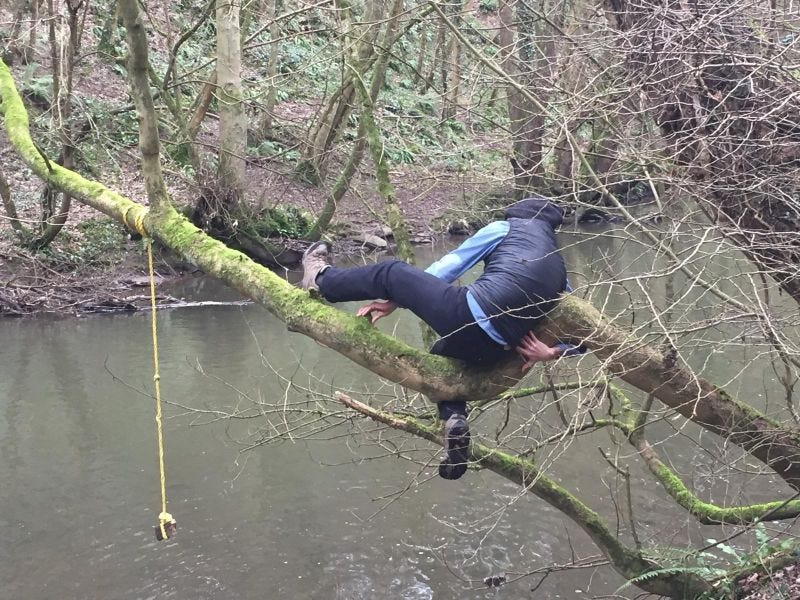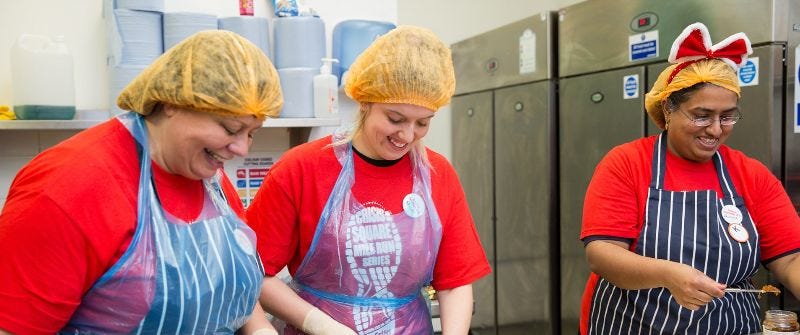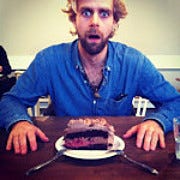Total Guts!

Get yer leg over!
Happy Friday!
This week I believe in Guts!
Science is complex. The science of the gut is both complex and young. I’m not a scientist, let alone a gastroenterologist.
At best I am ‘sciencey’, with just enough reading to unwittingly mislead myself and other people on the internet.
And yet here we all are.
So, without further ado, here is what I think I know about the science of the gut, and how I have used it to completely change the food I enjoy and, most significantly, to wean myself off sugar.
Caveat emptor. Also: caveat bullshitor.
The Microbiota-Gut-Brain Axis
First up, let’s define some terms.
Your microbiota are the various strains of different bacteria that help you digest your food. Yep, that’s right: there are trillions of microbial organisms living inside your gut right now.
Your gut actually behaves like a second brain of over 100 million nerve cells called the enteric nervous system, which can communicate with your head-brain through the vagus nerve, and also by releasing bacterial metabolites into the bloodstream.
(But remember that I did say that the science is young and, to be honest, no one is 100% sure how this all works, okay?)
This is called the microbiota-gut-brain axis and, quite frankly, I find the whole thing completely mind-blowing. (Or should that be gut-blowing? No, no it shouldn’t.)
For example, there is evidence that the bacteria in your stomach can influence your mood, symptoms of anxiety and depression, and even stuff like autism, Parkinson’s and Alzheimer’s.
However, for this dollop of sciencey writing, I’m going to limit myself to (what I now think is) the obvious.
The food you put into your mouth also feeds the bacteria that grow in your stomach, who use the microbiota-gut-brain axis to influence the food you crave and thus put into your mouth.
That sounds (fairly) straight-forward, but think of the consequences.
What I’m saying is that you might be able to stop your cravings for chocolate, pasta or steak not in a dieting willpower kind of way, but in a permanent I-simply-don’t-really-like-that-any-more kind of way.
No one can currently say this from a place of scientific confidence because it’s still only a ‘could’ in the couched language of gastroenterology.
But I say this from a place of anecdotal confidence because a couple of years ago I stopped craving sugary snacks and puddings (I think) by killing the bacteria in my stomach that loves those sort of treats.
Without that variety of bacteria (or as many of them) sending pestering requests to my brain, I simply don’t fancy eating cake any more.
I’m not saying that you can definitely do this as well – all bodies and guts are different, and the science is still somewhat alchemical – but you can certainly give it a try.
How it works (maybe)
This is the mechanism, so far as I think I know:
Everyone has a different make up of bacteria in their gut. Some of this biome we’re born with and co-exist with us our whole lives; some we can change by changing our diet and our living environment.
These different strains of bacteria get their energy from different food sources. Some particularly like sugar, some prefer fats. The more sugar or fats these bacteria get, the more they reproduce, and the larger their population grows.
These bacteria influence the communication between your gut-brain and your head-brain, and can (could) influence the cravings that you have for different foods.
The greater the population of a certain type of bacteria in your gut, the ‘louder’ the clamouring for their favourite food becomes in your head-brain.
This is (could be) the source of what feels like unconscious cravings. Why do you reach for the cake tin, even when you know you shouldn’t? Bacteria done it (maybe).
The more you ‘listen’ to these cravings, the more you feed that particular strain of bacteria, the larger their population grows, and the more dominant their ‘voice’ becomes. Congratulations, your gut is out of whack and you can’t stay off the Skittles.
How to kill the bad guys
In 2017 I spent about 3 months not eating anything sweet, including fruit.
Starved of their usual food source, I think I managed to kill off most of my unhealthy sugar-loving bacteria.
I had a few days of headaches, which I like to imagine was the starving bacteria sending increasingly desperate signals for food. Like a cruel despot, I ignored them.
Since then, I haven’t had a problem with sugar. I don’t use willpower to avoid chocolate or biscuits, I just don’t fancy eating them.
I can eat sweet things in moderation. Nothing bad happens when I eat a bit of Christmas pudding. But, in general, I simply find sweet things ‘a bit much’.
This isn’t about me and my personal preferences. This is my gut bacteria dictating to me the foods they need to stay alive. It just happens that I’ve killed all the ones that loved me scoffing six bowls of Christmas pudding and twenty-seven mince pies.
And I don’t think I’m special. I think this approach is available to other people.
Yay optimism
I find gut science to be very optimistic. Every time you put something into your mouth is an opportunity for change.
Your gut biome can respond to changes in diet within hours, not weeks or months. So whatever you eat today directly affects what you will want to eat tomorrow (maybe).
Yes, it might take willpower to make the initial change: the bacteria in your stomach don’t want to be starved to death and will put up a fight, but I think we are mistaken to believe that maintaining our new healthy diet will always need willpower.
After the headaches (which only reassured me that I was doing the right thing), I don’t think I needed willpower to keep to my sugar-free diet for more than a week.
What I think is needed instead is an understanding of how our microbiota, gut and brain work together and how we can use this nascent science to give ourselves the best possible chance of eating the healthy diet we want.
Your mileage will vary.
Perhaps my 3-month sugar fast was excessive or maybe I was lucky and my gut responded better than most would. Who knows? You’ll have to see what works for you.
The Fast and the Curious
A few rules for sugar-fasting that worked for me:
No exceptions. Even one biscuit could keep those bad bacteria clinging on for dear life. For me, this included fruit and artificial sweeteners. I wanted that craving gone gone gone.
Trust the science. Vegetables are freakin’ delicious and the more you eat, the more you’ll love them. This works because it’s not ‘you’ who loves them, it’s the bacteria that you’re cultivating. Imagine you’re growing a beautiful garden: you’ve just got to get the soil right, pull up the weeds and keep watering the flowers.
Fast for longer than you feel is necessary. I can’t remember exactly how long I felt that I needed to use willpower, perhaps a week. After that, the rest of the 3-month fast wasn’t difficult at all: I was happily eating the more healthy foods that I and my microbiota now loved.
Replace your sugar intake with the type of food that nourishes the bacteria that you want. Eat at least 30 different types of vegetables every week. Don’t worry about 5-a-day or 7-a-day rules, just make sure your weekly shop involves something from every basket in the greengrocer.
Change your environment. Remove every last piece of sugary-food from your house. Stop going to places where you have a sugar-eating habit. That might mean changing where you shop, the cafes you visit or even the friends you hang out with (for the fasting period, at least!).
Finally: good luck, and let me know how you get on!
Further Reading
The Diet Myth by Tim Spector (2015) Tim is Professor of Genetic Epidemiology at Kings College London.
Gut by Giulia Enders (2015) Giulia is a resident doctor for Internal Medicine and Gastroenterology.
The Clever Guts Diet by Michael Mosley (2017) Michael is a broadcaster who trained as a doctor in the 80s, but apparently never practised.
Or anything else by an actual scientist...

Crisis at Christmas in London this year welcomed over 3,000 guests and served more than 32,000 meals. Sign ups for Christmas 2019 will open in October - get it in your diaries!
FICTION-NON-FICTION
Snippets from my reading in the last seven days.
FICTION
Gormenghast by Mervyn Peake (1950)
Bellgrove dropped his hands to his sides where they hung like dead weights. It was as though his joy at finding his little plan maturing so successfully was so all-absorbing that he had no faculties left over to control his limbs.
NON-FICTION
The Buddha Pill: Can Meditation Change You? by Dr Miguel Farias and Catherine Wikholm (2015)
'Morality can be divorced from spirituality. My ego can dissolve while I meditate, but when I get up it's reconstructed. You can meditate 22 hours a day, but in those two hours you have left, you are a human being living in matter, ... and this aspect of reality doesn't care too much if you're enlightened or not.'
The year started with two walks in the woods, a rope swing across a river and a climb up a tree. Long may it continue in that vein! (And in the constructive vein of 2018.)
Much love,
- dc

CREDITS
David Charles wrote this newsletter. David is co-writer of BBC Radio sitcom Foiled, and also writes for The Bike Project, Elevate and Thighs of Steel. He can be found at davidcharles.info and on Twitter @dcisbusy

SUCCESS.


